View in other NatureServe Network Field Guides
NatureServe
Montana
Utah
Wyoming
Idaho
Wisconsin
British Columbia
South Carolina
Yukon
California
New York
Fox Sedge - Carex vulpinoidea
Native Species
Global Rank:
G5
State Rank:
S4
(see State Rank Reason below)
C-value:
6
Agency Status
USFWS:
USFS:
BLM:
External Links
State Rank Reason (see State Rank above)
Carex vulpinoidea is widely distributed in Montana, yet only documented at about 23 occurrences between 1977 and 2016. It grows in disturbed and undisturbed wetlands, ditches, and along rivers. The existing data suggests that populations are stable, yet it seems to occur infrequently or is undercollected. Current data on population sizes, locations, and threats is needed.
- Details on Status Ranking and Review
Range Extent
ScoreG - 200,000-2,500,000 sq km (~80,000-1,000,000 sq mi)
Area of Occupancy
ScoreD - 6-25 4-km2 grid cells
Number of Populations
ScoreC - 21 - 80
Environmental Specificity
ScoreC - Moderate. Generalist or community with some key requirements scarce
Threats
ScoreD - Low
CommentThreat category includes: Hydrological alterations (potential).
General Description
PLANTS: A herbaceous, perennial sedge that grows in clusters or tufts (caespitose) from a stout rhizome. Culms are stiff, sharply triangular, erect, and 40–80 cm (Hurd et al. 1998).
LEAVES: Scattered on the lower half of the culm. Cauline leaves have sheaths opposite the blades that are cross-wrinkled, 2–6 mm wide, spotted red-brown or not (FNA 2002; Lesica et al. 2012). Blades are 120 cm long by 2-5 mm wide and longer than the flowering stems (FNA 2002).
INFLORESCENCE: Spicate, (3-)7-10 cm by 15 mm, with 10-15 branches. Flowers arranged in numerous, sessile and elongate-congested spikes. The flowering stems are shorter than the leaves (FNA 2002). [See more details in Reproductive Comments.]
Phenology
Fruiting July through August (FNA 2002).
Species Range
Montana Range
Range Descriptions
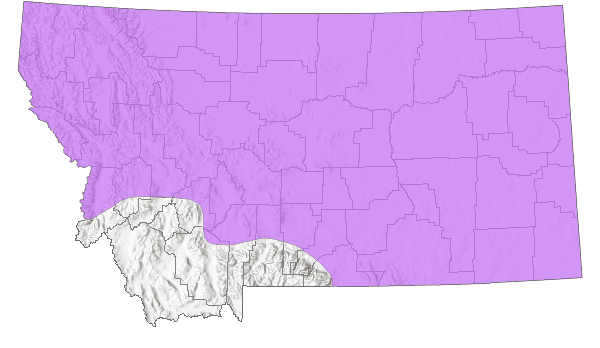
 Native
Native
Range Comments
Throughout temperate and boreal North America from 0 to 1,800 meters in elevation (FNA 2002; Lesica et al. 2012). It has been introduced into Europe (FNA 2002).
Observations in Montana Natural Heritage Program Database
Number of Observations: 27
(Click on the following maps and charts to see full sized version)
Map Help and Descriptions
Relative Density
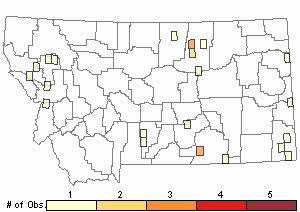
Recency
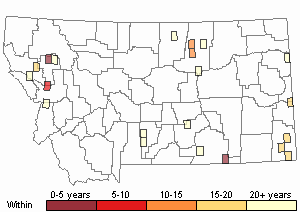

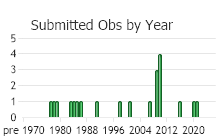
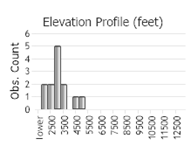 (Observations spanning multiple months or years are excluded from time charts)
(Observations spanning multiple months or years are excluded from time charts)
Habitat
Reproductive Characteristics
All spikes are similar with each spike being 4–7 mm long. Within a spike male flowers are above female flowers (androgynous) or all flowers are female (Hurd et al. 1998).
Perigynia are ascending to spreading, ovate, green to gray, glabrous, 2.5–3.5 mm tapered to the flattened, serrulate beak, 1–1.5 mm long; stigmas 2 (Lesica et al. 2012). Female scales are hyaline-tan with a green midvein, awned, as long as but narrower than the perigynia. Achene 2-sided, nearly filling the perigynium (Lesica et al. 2012).
Stewardship Responsibility
References
- Literature Cited AboveLegend:
 View Online Publication
View Online Publication Flora of North America Editorial Committee, eds. 2002. Flora of North America North of Mexico. Volume 23. Magnoliophyta: Commelinidae (in part): Cyperaceae. Oxford University Press, Inc., NY. xxiv + 608 pp.
Flora of North America Editorial Committee, eds. 2002. Flora of North America North of Mexico. Volume 23. Magnoliophyta: Commelinidae (in part): Cyperaceae. Oxford University Press, Inc., NY. xxiv + 608 pp. Hurd, E.G., N.L. Shaw, J. Mastrogiuseppe, L.C. Smithman, and S. Goodrich. 1998. Field Guide to Intermountain Sedges. General Technical Report RMS-GTR-10. Ogden, UT: U.S. Department of Agriculture, Forest Service, Rocky Mountain Research Station. 282 pp.
Hurd, E.G., N.L. Shaw, J. Mastrogiuseppe, L.C. Smithman, and S. Goodrich. 1998. Field Guide to Intermountain Sedges. General Technical Report RMS-GTR-10. Ogden, UT: U.S. Department of Agriculture, Forest Service, Rocky Mountain Research Station. 282 pp. Lesica, P., M.T. Lavin, and P.F. Stickney. 2012. Manual of Montana Vascular Plants. Fort Worth, TX: BRIT Press. viii + 771 p.
Lesica, P., M.T. Lavin, and P.F. Stickney. 2012. Manual of Montana Vascular Plants. Fort Worth, TX: BRIT Press. viii + 771 p.
- Additional ReferencesLegend:
 View Online Publication
View Online Publication
Do you know of a citation we're missing? Lesica, P., M.T. Lavin, and P.F. Stickney. 2022. Manual of Montana Vascular Plants, Second Edition. Fort Worth, TX: BRIT Press. viii + 779 p.
Lesica, P., M.T. Lavin, and P.F. Stickney. 2022. Manual of Montana Vascular Plants, Second Edition. Fort Worth, TX: BRIT Press. viii + 779 p.
- Web Search Engines for Articles on "Fox Sedge"





